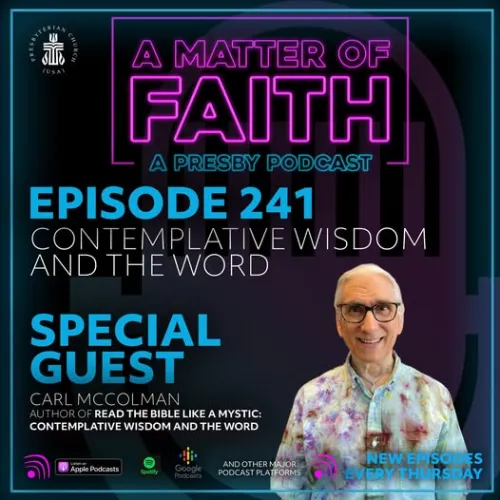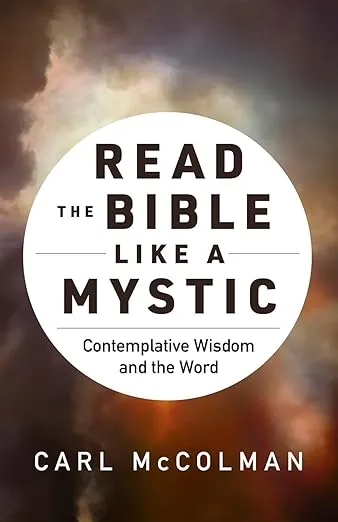Reading the Bible like a mystic does
Author, speaker, teacher and retreat leader Carl McColman appears on ‘A Matter of Faith: A Presby Podcast’

LOUISVILLE — Of all the ways we can read the Bible, the mystics offer us one that can help us encounter and experience God in ways other traditions can’t.
Carl McColman, a speaker, teacher and retreat leader who recently published “Read the Bible like a Mystic: Contemplative Wisdom and the Word,” was the guest last week of Simon Doong, host of “A Matter of Faith: A Presby Podcast.” Their 56-minute conversation can be heard here.

In his book, McColman suggests four interpretive ways of reading Scripture: the literalist approach, an agnostic or atheist approach, the historical-critical approach used by many Presbyterians, and the mystical approach based on “the writings and teachings of Christian writers and thought leaders we have called mystics,” McColman said. “What they offer us is this fourth hermeneutical approach which in many ways weaves the best of the other three.”
“Contemplatives would say they ask the hard questions so they can wrestle with their faith and be invited deeper,” he said. “It’s anchored in seeking that relationship with the Holy, the Mystery, without any negativity toward the gift of scholarship and the historical-critical method.”
Theologians dating back to Origen stressed that reading the Bible is “about bringing love and grace, freedom, mercy and kindness into the world,” McColman said, citing as an example the distinction conservative and progressive Christians see in the taxonomy of sin.
“In conservative world, sin is a personal dynamic,” McColman said. “The salvation Jesus offers is deliverance from those personal failings. On the liberal side, it’s more academically informed, more cognizant of the role that psychology, sociology and cultural forces play in our personal behavior. It de-emphasizes the need for personal conversion and is more of a pushback against systemic sin,” including racism, sexism, homophobia and transphobia, and economic injustice.
“Conservatives focus on the individual’s program for self-improvement or self-healing and give the system a pass,” he said. “Liberals tend to do it the other way around. Really, the biblical text fires on both those cylinders.”
While McColman said he’s a member of the progressive camp both theologically and philosophically and is “very sympathetic to how we struggle for justice and dismantle the systems of oppression and privilege,” there is “still the question, if there is a God, what does it mean for me and my heart to encounter the living God, and how does that make a difference in my life?”
“It’s less about what our thermostat will be set on in eternity,” he said, “and it’s more about how do I enter into a transformed life here and now? That’s where the mystics challenge all of us, whether you identify as conservative or progressive. Maybe we all need a more robust definition of what spirituality is.”
Part of that has to do with “this paradox of interior transformation and also social revolution, this idea that the Spirit of God calls us into a revolutionary society, the Beloved Community, a society based on love and kindness and kinship and relationship,” he said.
“For people of goodwill, the text lands in different ways,” McColman told Doong, and that’s why it’s best to interpret the Bible in community and not individually.
“There’s this bedrock principle that church happens in community,” he said. “That doesn’t mean there isn’t space for that individual experience. It’s a kind of tension. We need the individual encounter with the Mystery, but we also need the community to hone and form and shape our best practices as people of faith.”
“Who gets to decide? We have to decide together,” McColman said. “There has to be communal discernment.”
McColman believes the missing “secret sauce” in many progressive churches with, for example, a membership that’s aging is “that personal challenge. How are you giving your life to the spirit of love, the spirit of Christ, the spirit of holiness? How is this making a difference, and how can it help transform and heal society?”
Writing in the 1960s, the German Jesuit theologian Karl Rahner wrote that the Christian of the future will be a mystic or will not exist, McColman noted. While it’s “a bold and frightening statement,” there’s “a crisis in progressive Christianity today.” Too many churches are dealing with this crisis using “old ways of thinking, like, ‘We need a better outreach campaign’ or ‘We need an afternoon program for kids,’” he said.
“What Karl Rahner means is we need to have that interior sense of the encounter with the Divine. … A lot of polite, educated mainstream Christians don’t like to talk about those kinds of things,” McColman said. “While we’re not talking about them, younger people are less and less likely to show up.”
“You have given us a lens to understand why the way we’ve always done it is not the only way we experience the Divine and grow in our faith,” Doong told McColman.

One chapter of McColman’s book is devoted to the religious imagination, a title that “makes people nervous,” he said. “At the end of the day, how do we meet God? We meet God in our imagination.” When McColman visits the Gulf of Mexico and looks out “into that beautiful, vast water, my imagination takes flight. I see the presence of God. How do I sense that presence? There is something in my imagination that can take that moment and tie it in to stories from Scripture, stories from my childhood, stories from people I love, respect and admire,” he said. In that imaginative space, he is able to make what Danish theologian Søren Kierkegaard called “that leap of faith.”
“To look at a beautiful work of art implies that there’s an artist,” McColman pointed out.
Biblical accounts of miracles make some liberal-minded people nervous, McColman noted. Did Jesus really walk on water? Was he raised from the dead and ascended into heaven? “The Bible is shot through with these stories, and the academic tradition sees them as myth,” he said. “What I argue is de-mythologizing the Bible is like taking a Marvel Comics movie and removing all the special effects. What kind of movie would you have? It would be a pretty boring movie.”
The biblical stories of miracles and wonders “are designed to stimulate our imagination, to make us more available for the experience we can interpret as ‘This is God present in our lives, making a difference.’”
Ask McColman why he’s still a Christian and he’ll tell you it’s because “I need to follow someone who challenges me to love my enemies, to forgive 70 times 7 times.” The Bible includes “all this ‘gee whiz’ kind of stuff — the resurrection and the walking on water — but what makes Christianity really life-giving is the teachings. If you took away all the ‘gee whiz’ stuff, no one will pay attention to the teachings.”
New editions of “A Matter of Faith: A Presby Podcast” drop every Thursday. Listen to previous installments here.
You may freely reuse and distribute this article in its entirety for non-commercial purposes in any medium. Please include author attribution, photography credits, and a link to the original article. This work is licensed under a Creative Commons Attribution-NonCommercial-NoDeratives 4.0 International License.




